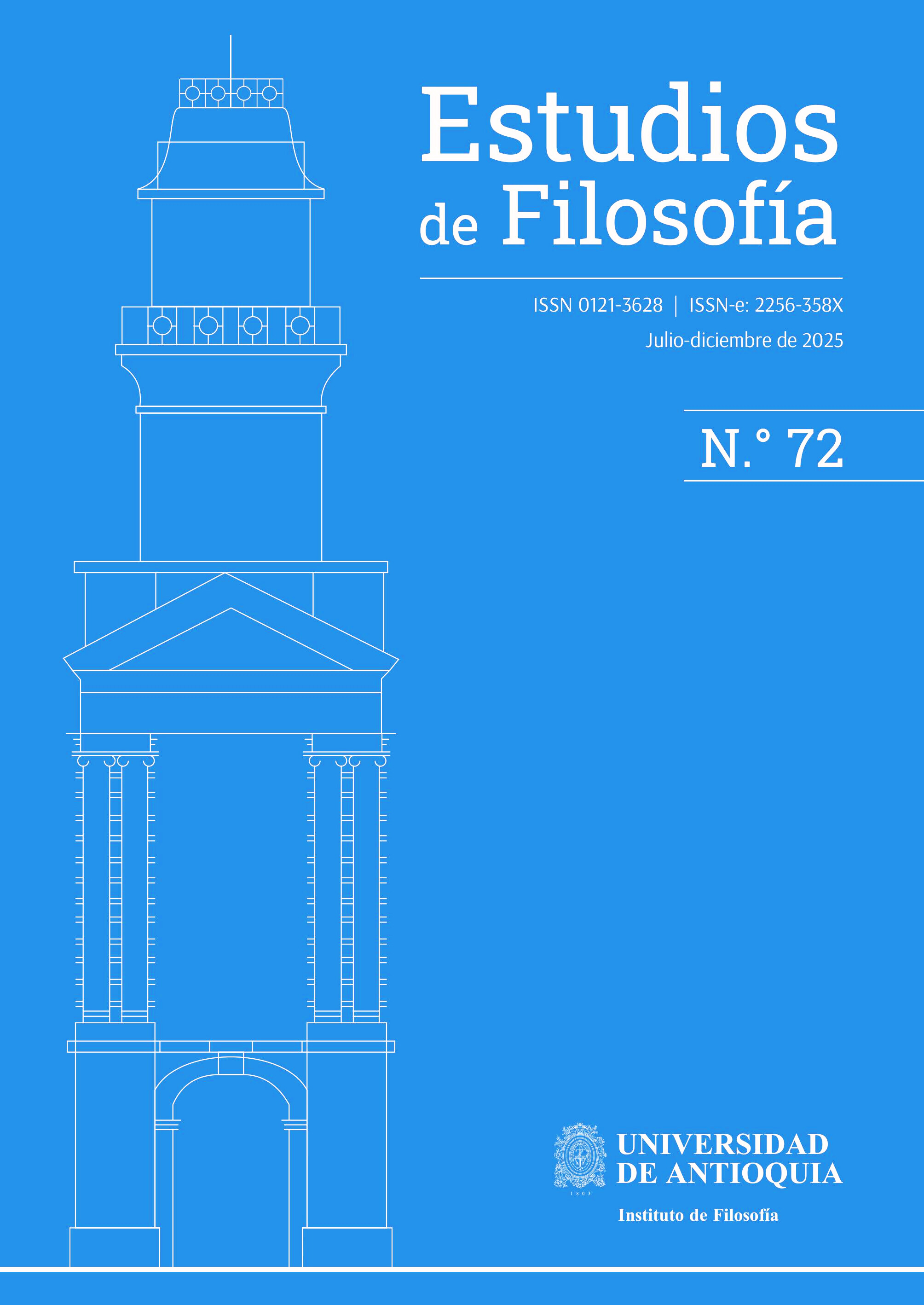De anomalías y revoluciones: el colapso de los paradigmas
DOI:
https://doi.org/10.17533/udea.ef.356920Palabras clave:
anomalías, revoluciones científicas, paradigmas, ciencia, ideologíaResumen
En La función del dogma en la investigación científica (1979), Thomas Kuhn enfatiza la necesidad de que las ciencias maduras formen a sus recursos humanos propiciando una fuerte adhesión a los fundamentos ontológicos y epistemológicos que sustentan dicha concepción paradigmática. Esta tesis, que de algún modo quita perspectiva a las y los científicos, deja abierta la cuestión de cómo tan fuerte adhesión dogmática permite la crítica y a la postre la revolución científica. En “Ciencia normal, dogmatismo y progreso” (2023), Pablo Melogno revisa críticamente esta propuesta kuhniana y la de una serie de analistas de su obra. Concluye que la propuesta de Kuhn es atinada por cuanto contempla cómo la tensión conservación-crítica permite en ciertas circunstancias sostener la fuerte adhesión incorporada, y en otras circunstancias ejercer una crítica informada ante una abrumadora acumulación de anomalías. En este artículo, sugiero que no son solo factores de índole racional los que llevan a un colectivo a decidir sobre la continuidad o el cambio paradigmático, sino que también inciden factores de tipo ideológico y cultural, frecuentemente naturalizados y difíciles de objetivar.
Descargas
Citas
Bohr, N. (1988). La teoría atómica y la descripción de la naturaleza. (M. Melgar, trad.) Alianza.
Bourdieu, P. (1999). El campo científico. En Intelectuales, política y poder (pp. 75-110). (A. Gutiérrez, trad.). Eudeba.
Forman, P. (1984). Cultura en Weimar, causalidad y mecánica cuántica 1918-1927. (J. M. Sánchez Ron, trad.). Alianza.
Gould, S. J. (1988). La falsa medida del hombre. (M. Esteves, trad.). Orbis.
Heisenberg, W. (1959). Física y Filosofía. (F. Tezanos, trad.). Ediciones La Isla.
Hendry, J (1980). Weimar culture and quantum causality. History of Science, (18)3, 155-180. https://doi.org/10.1177/007327538001800301
Kraft, P., & Kroes, P. (1984). Adaptation of Scientific Knowledge to an Intellectual Environment. Paul Forman’s “Weimar Culture, Causality, and Quantum Theory, 1918–1927”: Analysis and Criticism. Centaurus, 27(1), 76-99. https://doi.org/10.1111/j.1600-0498.1984.tb00754.x
Kuhn, T. (1979). La función del dogma en la investigación científica. (D. Eslava, trad.). Revista Teorema.
Kuhn, T. (1993). La tensión esencial. (J. Racine, trad.). Fondo de Cultura Económica.
Kuhn, T. (2013). La Estructura de las revoluciones científicas. (A. Contin, trad.). Fondo de Cultura Económica.
Mauss, M. (1979). Sociología y Antropología. (T. Rubio, trad.). Tecnos.
Melogno, P. (2023). Ciencia normal, dogmatismo y progreso científico. En L. A.-C. Pereira Martins, L. M. Duque Martínez, L. Federico, G. Guerrero Pino, G. y M. M. O’Lery (Eds.), Reflexiones filosóficas e históricas: ciencia, enseñanza de la ciencia y política científica (pp. 13-26). AFHIC-Universidad del Valle.
Merton, R. (1977). La ciencia y el orden social. En La Sociología de la Ciencia 2 (pp. 339-354). (F. Torner y R. Borque, trads.). Alianza Universidad.
Stengers, I. (2014). La propuesta cosmopolítica. Revista Pléyade, (14), 17-41. https://www.revistapleyade.cl/index.php/OJS/article/view/159
Descargas
Publicado
Cómo citar
Número
Sección
Categorías
Licencia
Derechos de autor 2024 Jorge Rasner

Esta obra está bajo una licencia internacional Creative Commons Atribución-NoComercial-CompartirIgual 4.0.
Los autores que publican en Estudios de Filosofía acuerdan los siguientes términos:
1. El Autor retiene el copyright del "Artículo", por el cual se entiende todos los objetos digitales que pueden resultar de la subsiguiente publicación o distribución electrónica.
2. En conformidad con los términos de este acuerdo, el autor garantizará a Estudios de Filosofía como Editor el derecho de la primera publicación del artículo.
3. El Autor le concederá al Editor un derecho perpetuo y no-exclusivo, así como una licencia de la misma clase, de publicar, archivar y hacer accesible el Artículo parcial o totalmente en todos los medios conocidos o por conocerse, derecho y licencia que se conocen como Creative Commons License Deed. Atribución-No Comercial- Compartir igual CC BY-NC-SA o su equivalente que para efectos de eliminar toda duda, le permite a otros copiar, distribuir, y transmitir el Artículo bajo las siguientes condiciones: (a) Atribución: Se deben reconocer los créditos de la obra de la manera especificada por el Autor a Estudios de Filosofía, pero no de una manera que sugiera que tiene su apoyo o que apoyan el uso que hace de su obra. (b) No Comercial: No se puede utilizar el Artículo para fines comerciales.
4. El Autor puede realizar otros acuerdos contractuales no comerciales para la distribución no exclusiva de la versión publicada del Artículo (v. gr. ponerlo en un repositorio institucional o publicarlo en un libro) con la condición de que haga el debido reconocimiento de su publicación original en Estudios de Filosofía.
5. A los Autores se les permite y Estudios de Filosofía promueve publicar en línea (online) la versión pre-impresa del Artículo en repositorios institucionales o en sus páginas web, antes y durante la publicación, por cuanto que puede producir intercambios académicos productivos, así como una mayor citación del Artículo publicado (ver The Effect of Open Access). Dicha publicación durante el proceso de producción y en la publicación del Artículo se espera que se actualice al momento de salir la versión final, incluyendo una referencia a la URL de Estudios de Filosofía.















